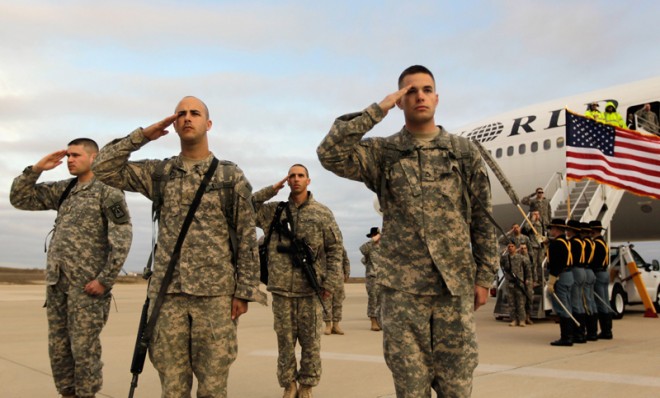Why can't Americans make up their minds about the Iraq war?
Nearly two-thirds of us thought the war was a mistake five years ago. Now barely half do


A free daily email with the biggest news stories of the day – and the best features from TheWeek.com
You are now subscribed
Your newsletter sign-up was successful
Ten years after the invasion of Iraq, 53 percent of Americans now say the war was a mistake, according to a new Gallup poll. Forty-two percent still think that it was a good idea — even though it lasted years longer than promised, even though it cost more lives and money than anyone expected, even though Saddam Hussein's weapons of mass destruction, one of the justifications for the war, never turned up. In 2008, Americans had a far dimmer view, with 63 percent calling the war a mistake. Immediately after the 2003 invasion only 23 percent thought it was a bad idea.
"Wars often spur times of immense national unity — moments in which partisan politics dissipate and dissent is muted," says Gallup. But the consensus is "is famously temporary." In hindsight, opinions about the war vary sharply along — what else? — partisan lines. "Not surprisingly," the polling firm says, "given that the war was begun in the administration of a Republican, former President George W. Bush," 66 percent of Republican-leaning respondents think the U.S. was right to go into Iraq, while 73 percent of Democratic leaners think the decision was an error.
Given that division, it might seem obvious that liberals find it hard to believe the percentage of people opposed to the war is getting smaller. In fact, among Americans under 50, exactly half think the war was a mistake. "How is it, ten years after the fact and with the benefit of hindsight, that 42 percent of the country still believes that invading Iraq wasn't a mistake? What would it take to convince these people?" asks Kevin Drum at Mother Jones. "This bodes ill for the prospect that we might be a wee bit more skeptical the next time our government tries to scare us all into a war."
The Week
Escape your echo chamber. Get the facts behind the news, plus analysis from multiple perspectives.

Sign up for The Week's Free Newsletters
From our morning news briefing to a weekly Good News Newsletter, get the best of The Week delivered directly to your inbox.
From our morning news briefing to a weekly Good News Newsletter, get the best of The Week delivered directly to your inbox.
Apparently, one reason opposition to the war is inching back down is that young people are more hawkish than many people thought. In fact, ask Americans their opinions about the decisions to send U.S. soldiers to fight in Iraq, or Afghanistan, or even Vietnam, and 18- to 29-year-olds "were the most hawkish" age group of all, notes Ed Kilgore at Washington Monthly. Over-65s were "the most dovish." Talk about a change from the 1960s.
The most stunning gap is over Vietnam, where under-30s think it was "not a mistake" for the U.S. to send troops by a 53-41 margin, while over-65s think it was a mistake by a 70-23 margin. The only gap that rivals that one in the survey is between Republicans and Democrats on Iraq, where the former say sending troops was not a mistake by a 66-30 margin, and the latter say it was a mistake by a 73-22 margin.
Gallup doesn't give us cross-tabs by party and age, but it does make you wonder if young Republicans may be super-hawks rather than libertarian non-interventionists. And I personally have to wonder what kind of history instruction under-30s have received when it comes to Vietnam. [Washington Monthly]
It's interesting to ponder this figure, as it's the first time Gallup has asked the question since the full withdrawal of American troops in December 2011, says Rick Moran at American Thinker. But it's still too early go give the war a final grade. Even opinions on Vietnam are still changing — 57 percent say that war was a mistake, but that's down from 69 percent in 2000. And remember Afghanistan, the so-called good war? Now only a slim majority — 51 percent — say that fight wasn't a mistake.
In truth, it would be better to wait a decade and revisit the question. Transient events tend to receive too much emphasis. The test of whether the war was a "mistake" will be what Iraq looks like down the road — whether it falls apart or gets itself together. Right now it doesn't look good, but there are forces at work — more secular, more western-friendly — that have a chance to remake Iraq if given the opportunity. [American Thinker]
A free daily email with the biggest news stories of the day – and the best features from TheWeek.com
Harold Maass is a contributing editor at The Week. He has been writing for The Week since the 2001 debut of the U.S. print edition and served as editor of TheWeek.com when it launched in 2008. Harold started his career as a newspaper reporter in South Florida and Haiti. He has previously worked for a variety of news outlets, including The Miami Herald, ABC News and Fox News, and for several years wrote a daily roundup of financial news for The Week and Yahoo Finance.
-
 One great cookbook: Joshua McFadden’s ‘Six Seasons of Pasta’
One great cookbook: Joshua McFadden’s ‘Six Seasons of Pasta’the week recommends The pasta you know and love. But ever so much better.
-
 Scientists are worried about amoebas
Scientists are worried about amoebasUnder the radar Small and very mighty
-
 Buddhist monks’ US walk for peace
Buddhist monks’ US walk for peaceUnder the Radar Crowds have turned out on the roads from California to Washington and ‘millions are finding hope in their journey’
